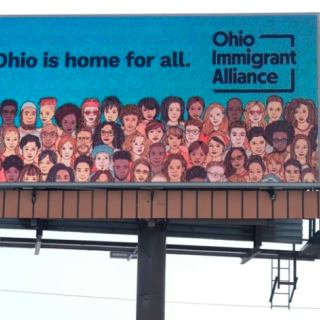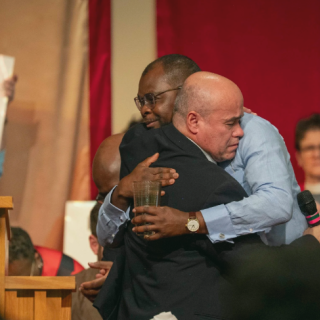Advertisement
This article was first published by Policy Matters Ohio
In the 1960’s, my grandfather joined the United Steelworkers and together with my grandmother, a nurse, they changed the entire trajectory of our family through the stability and opportunities they earned. Almost 60 years later, my husband joined the International Brotherhood of Electrical Workers (shout out to Local 683!) after being a non-union journeyman for several years. In addition to better pay, his jobs are more secure, his health insurance more comprehensive, and his worksites safer. I worked in food service, retail, as a nanny, and as a home childcare provider before joining Policy Matters Ohio and the staff union. I have rights and benefits at work that I never even dreamed of as a low-wage hourly worker, like guaranteed wage increases and paid family & medical leave.
I joined the Central Ohio Worker Center (COWC) in 2016 as a volunteer because I believed that a grassroots group of dedicated people could help workers build solidarity and power, even when obstacles like language barriers and anti-immigrant policies make it difficult for them to form or join a union. I’m still here (now as Board President), because I was right.
COWC educates and advocates with low-wage and immigrant workers in a variety of ways:
- With our free, bilingual wage theft clinic, we inform community members about their rights in the workplace — including the right to work in a safe, harassment-free environment, and the right be paid for every hour they work.
- When employers violate those rights, we help workers connect with the appropriate attorney, agency, or trusted partner organization.
- We also help people access apprenticeship and pre-apprenticeship programs that lead to good union jobs.
- As policy advocates, we helped pass a law that prevents and punishes wage theft in the city of Columbus, and advocated against a bill that would have indirectly excluded undocumented workers from receiving Ohio workers’ compensation funds.
One of the best things about volunteering with COWC has been working alongside and getting to know the brilliant and fearless trio who lead their work: Claudia Cortez, Isbel Alvarado, and Molly Shea. (To hear directly from Claudia and Isbel about their work, check out this recent episode of What’s Good Ohio?!, the podcast from Policy Matters and Ohio Voice.) The COWC staff never miss an opportunity to help people recognize wage theft, one of the most common crimes committed against working people. I know they would want me to include this list of the five most common types of wage theft:
- Minimum wage violations: As of January 1, 2024 the minimum wage in Ohio is $10.45 an hour for non-tipped employees and $5.25 an hour for tipped employees. Employers must pay workers at least the minimum wage for every hour they work.
- Overtime violations: If an employee works more than 40 hours in a workweek, the employer must pay them one and a half times their hourly base rate.
- Paycheck violations: Sometimes employers fail to pay workers on time, or take illegal deductions from their paychecks. Ohio is one of just nine states that don’t require employers to provide paystubs. This makes workers even more vulnerable to this type of wage theft. Sometimes workers don’t receive their paychecks at all!
- Tip violations: Sometimes, especially in restaurants and bars, employers break the rules governing what tip deductions are allowed, or they force tipped employees to split tips with non-tipped employees. (This is one good reason Ohio’s minimum wage law should be expanded to cover tipped workers. You can read more about that here.)
- Misclassification violations: These occur when a worker is considered an “independent contractor,” when they should be properly categorized as an “employee.” The COWC sees employers misclassify workers in order to avoid requirements to withhold taxes, provide certain workplace protections and benefits, and report for state and federal unemployment insurance and state-sponsored workers’ compensation.
Last year, COWC provided more than 550 workers with a free, comprehensive Know Your Rights in the Workplace Handbook, available in English and Spanish. (Download your free copy of the handbook here.) When people learn about the many ways employers can violate their rights, they often tell us, “That happened to me! I didn’t know I could do anything about it!” That’s why we don’t stop at informing people about workplace rights; we also help take action against wage thieves and other unscrupulous employers. We have spent years building relationships with local, state, and federal agencies; attorneys; and community organizations that help workers collect the wages they are owed, address safety concerns in the workplace, and gain the confidence to engage with each other to raise the floor for all workers.
As you can probably tell, I don’t just enjoy this work — I believe it is crucial to building an Ohio that works for workers of all races, backgrounds, and genders. If you agree, you can support COWC by becoming a member, donor, and/or amplifier on Facebook, Twitter, or Instagram.
----------------------------------------
Ali Smith (she/her) is Policy Matters Ohio operations specialist and worker center network liaison (Work & Wages). Ali coordinates work among Ohio's developing network of worker centers in Cincinnati, Columbus and Cleveland. Ali was born and raised in Stark County, to a family supported and empowered by union steelwork. She now lives with in the Hocking Hills area and is passionate about building power for all workers, particularly marginalized groups, including those in the Appalachian region and other rural communities. Ali is also the president of the Central Ohio Worker Center's board of directors. Her work for COWC has included social media strategy, immigrant rights campaigns, project management, development, and helping get a wage theft ordinance passed in Columbus in 2020.



